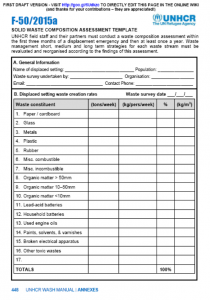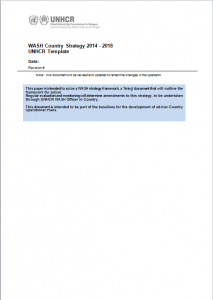UNHCR field staff and their partners should conduct a waste composition assessment to assess the types of waste being produced and their and rates of production. Ideally the assessment should be carried out within the first three months of a displacement emergency and then at least once a year. Waste management short, medium and long term strategies for each waste stream should be revaluated and reorganised according to the findings of this assessment.
Archives
F-500/2015a UNHCR Solid Waste Composition Assessment Template (UNHCR, 2015)

F-104/2015a UNHCR Site Level Refugee WASH Strategy Template (UNHCR, 2015)

Where required, UNHCR and WASH actors should work together to develop a site level refugee WASH strategy document that clearly describes the refugee context, the baseline WASH situation, WASH coverage, WASH gaps, along with short (6 months), medium (6 months – 5 years) and long-term (>5 years) strategies for each of the WASH sub-sectors and the twelve (12) WASH principles. This template can be used to help produce the site level WASH Strategy.
UNHCR Country WASH Strategy Template (UNHCR, 2015)

Where required, UNHCR and WASH actors should work together to develop a country level refugee WASH strategy document that clearly describes the refugee context, the baseline WASH situation, WASH coverage, WASH gaps, along with short (6 months), medium (6 months – 5 years) and long-term (>5 years) strategies for each of the WASH sub-sectors and the twelve (12) WASH principles. This template can be used to help produce the Country level WASH Strategy.
- Tags: WASH Coordination and WASH Coordination.
F-101/2015a UNHCR WASH Universal Access Checklist (UNHCR, 2015)

This document has been designed to help UNHCR and WASH actors assess WASH infrastructure for potential access from the individual perspective of each type of vulnerable user in particular persons with disabilities, women, children, and the elderly.
- Tags: Bathing Facilities, Disability, and Laundering Facilities.
F-100/2015a UNHCR WASH Safety and Security Checklist (UNHCR, 2015)

This document has been designed to help UNHCR and WASH actors assess potential WASH related safety and security issues related to trip, crush, pinch, pierce, cut, splinter, burn, poison, electrocution, road traffic accident, drowning, and gender based violence.
- Tags: Gender Based Violence.
OG-802 Operational Guidelines for Staff Health and Safety in Refugee WASH Programmes (UNHCR, 2015)

This document provides health and safety guidelines for refugee WASH programmes for staff are involved in either: cleaning of toilets; maintenance of toilets; desludging of toilets; the collection and movement of excreta; the collection or movement of solid wastes; the handling of vector control or water treatment chemicals; any staff who may potentially come into contact with excreta, sewage, wastewater, solid waste, medical waste or any other sources of (potential) infection.
DG-300 Design Guidelines for Piped Water Networks in Refugee Settings (UNHCR, 2015)

This document contains guidelines to help UNHCR and WASH actors design piped water networks in refugee settings. It describes the minimum documentation that should be included for a water network design project.
- Tags: Piped Water Networks, WASH Programme Management, WASH Programme Management, WASH Programme Management, WASH Programme Management, WASH Programme Management, WASH Programme Management, Water Pumping, and Water Storage. Categories: WASH Design Guidelines, WASH Guidelines, WASH Guidelines, WASH Policy Guidelines, WASH Policy Guidelines, and WASH Technical Designs.
Costing Water Services in a Refugee Context (IRC and UNHCR, 2015)

This report presents a methodology to cost water services that has been adapted from the life-cycle costs approach (LCCA) and looks at its applicability to refugee settings.
- Tags: Value for Money. Organisations: IRC (International Water and Sanitation Centre). Categories: WASH Research Documents.
F-900/2015a UNHCR WASH Assessment Primer Questions (UNHCR, 2015)

These WASH related primer questions have been designed to assist UNHCR and WASH actors collect data from key informants and focus groups during WASH assessments. The list of questions is not exhaustive and is merely intended as a conversation primer (aide memoire).
- Tags: Human Right to Water / Sanitation, Hygiene Promotion, Protection, Public Health, Solid Waste Management, Solid Waste Management, WASH Strategy Development, WASH Strategy Development, WASH Strategy Development, WASH Strategy Development, WASH Strategy Development, WASH Strategy Development, Water Supply, Water Supply, and Water Supply.
F-901/2015a UNHCR Excreta Management Assessment Tool (UNHCR, 2015)

This assessment tool has been designed to assist UNHCR and WASH actors collect data on excreta management during a needs assessment. The main purpose of this tool is to identify problems related to excreta management and identify actions to bring conditions to UNHCR standards.
- Tags: Communal Toilets, Communal Toilets, Desludging and Excreta Transportation, Excreta / Urine ReUse, Excreta Composting, Excreta Management, Excreta Management, Excreta Treatment, Household Toilets, Sewerage and Excreta Conveyance, WASH Assessments, WASH Assessments, WASH Assessments, WASH Assessments, WASH Assessments, WASH Assessments, and WASH Assessments. Languages: English, English, English, English, English, English, English, English, English, and English. Organisations: UNHCR, UNHCR, UNHCR, UNHCR, UNHCR, UNHCR, UNHCR, UNHCR, UNHCR, and UNHCR. Categories: WASH Blank Forms, WASH Blank Forms, WASH Blank Forms, WASH Blank Forms, WASH Blank Forms, WASH Blank Forms, WASH Blank Forms, WASH Emergency Guidelines, WASH Emergency Guidelines, WASH Emergency Tools, WASH Emergency Tools, WASH Reference Documents, WASH Reference Documents, WASH Reference Documents, WASH Reference Documents, WASH Reference Documents, WASH Reference Documents, WASH Reference Documents, WASH Reference Documents, WASH Reference Documents, and WASH Reference Documents.
 English
English
